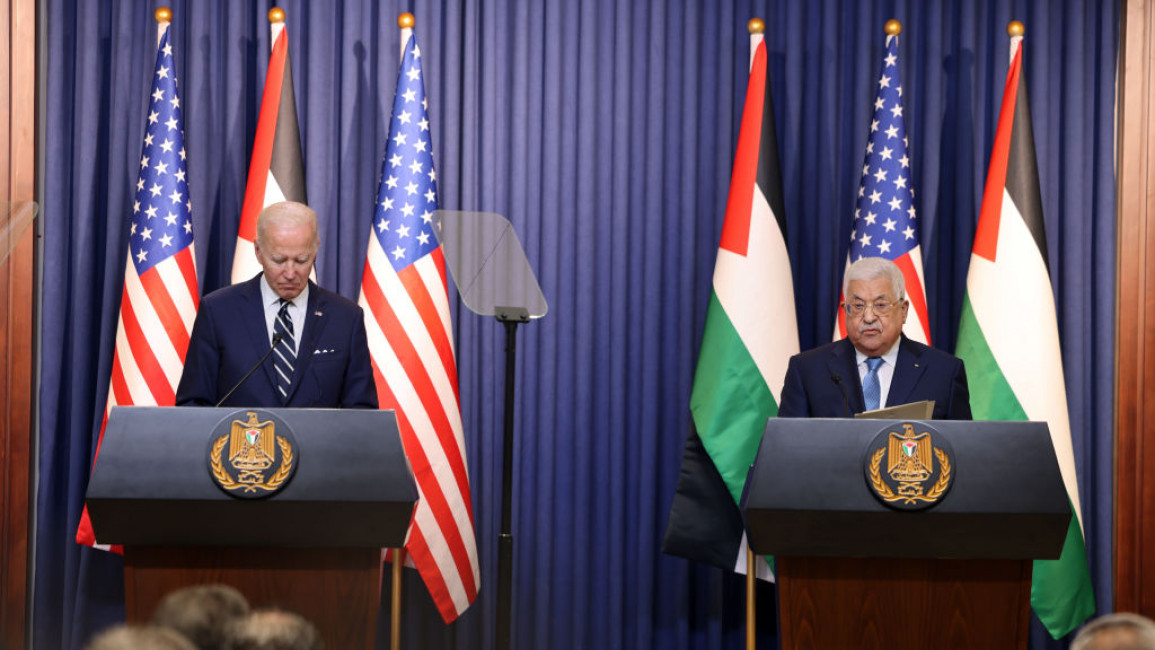Biden says Palestinians need to see 'political horizon' during Bethlehem visit
US President Joe Biden said during a trip to the occupied West Bank on Friday that Palestinians need to see a path towards statehood, even if hopes for a peace process with Israel remain bleak.
Biden's visit to Bethlehem came ahead of a flight to Saudi Arabia, whose leaders on Friday changed aviation rules in an apparent gesture of openness towards Israel that comes amid longstanding speculation Riyadh could controversially normalise ties with Tel Aviv.
Riyadh paved the way for Israeli planes to use its airspace by announcing it was lifting restrictions on "all carriers", a move welcomed by Biden as "historic".
The president's visit to the Saudi city of Jeddah will follow talks with Abbas, the latest high-level diplomatic meeting after those with the Israeli leadership on Thursday.
Biden reiterated his administration's commitment to a two-state solution to end the Israeli-Palestinian conflict, saying there "must be a political horizon that the Palestinian people can actually see".
"I know that the goal of the two states seems so far away," he said in Bethlehem, alongside Abbas.
The Palestinian president said he was "taking steps" to improve the bilateral relationship and aimed to see the US consulate to Palestinians reopen in Jerusalem, which was shuttered by Trump.
"The key to peace begins with recognising the state of Palestine," Abbas said.
With Israeli-Palestinian peace negotiations moribund since 2014, the US delegation has been focusing on economic measures.
Biden announced an additional $200 million for the UN agency serving Palestinian refugees, which saw funding cut by the previous US president, Donald Trump.
During a visit earlier Friday to a hospital in Israeli-annexed and occupied East Jerusalem, Biden pledged a $100 million aid package for medical institutions in the area.
But he made clear on Thursday he had no plans to reverse the controversial move by Trump to recognise Jerusalem as Israel's capital, which infuriated Palestinians.
Palestinians view East Jerusalem as the capital city of their future independent state, and the United Nations considers the area occupied Palestinian territory.
The US delegation was to also announce plans to roll out infrastructure for 4G internet across the Gaza Strip and the West Bank by the end of next year, fulfilling a longstanding aspiration among Palestinians.
Slain Palestinian-American reporter
With Palestinians banned by Israel from political activity in Jerusalem, the US president travelled to Bethlehem to meet Abbas.
He was greeted by a billboard reading "Justice for Shireen", a reference to veteran Palestinian-American journalist Shireen Abu Akleh, who shot dead by Israeli forces in May while covering an army raid in the West Bank.
Abu Akleh's family requested to meet Biden during his visit, but a senior administration official told reporters the president "is unable to do that," and noted that the family had been invited to Washington.
"I think if President Biden [can] find an hour and a half to go and attend a sport activity, he should have respected the family and give them 10 minutes to listen to them," said Samer Sinijlawi, chairman of a Palestinian nonprofit, the Jerusalem Development Fund, after Biden on Thursday attended a ceremony for Jewish athletes.
In Bethlehem, dozens of protesters gathered carrying pictures of Abu Akleh and signs against Israeli settlements in the West Bank.
Speaking alongside Abbas, Biden said the US "will continue to insist on a full and transparent accounting of her death."
Biden, struggling to pronounce her name, said Abu Akleh "was performing very vital work" when she was killed.
Washington earlier this month concluded she was likely shot from an Israeli military position, but that there was no evidence of intent to kill.
Palestinian leaders, including Abbas, as well as Abu Akleh’s family, have rejected the State Department report and called for accountability for the Israeli military.
Next stop, Jeddah
The focal point of Jerusalem talks between Biden and Lapid was Iran's nuclear programme and its support for Islamist groups such as Hamas, which rules the besieged Gaza Strip.
Biden and Lapid signed a new security pact, in which Washington committed to using all its "national power" to ensure Tehran does not obtain a nuclear weapon.
Washington is currently trying to get the nuclear deal between Tehran and world powers back on track, after Trump's unilateral withdrawal in 2018 derailed it.
Thousands of Palestinians in the West Bank and Gaza Strip took to the streets on Thursday to protest US President Joe Biden's visit to the region. https://t.co/TC8VyitDDu
— The New Arab (@The_NewArab) July 15, 2022
In a tweet on Friday, Iran's Foreign Minister Hossein Amir-Abdollahian said Biden's trip to Israel was a "puppet show" that made his country "more determined" to protect its nuclear interests.
Following the visit to the West Bank, Biden will fly from Israel to Iran's regional rival Saudi Arabia.
Riyadh's decision to scrap airspace restrictions was welcomed as "good news" by Lapid, who called it "only the first step", as Israel presses for closer regional ties.
It comes amid speculation Saudi Arabia could join other Arab nations like the UAE and Bahrain in normalising ties with Israel, a controversial move which has been slammed by Palestinians as a betrayal that damages their national cause.
Saudi Arabia has long stressed its commitment to the decades-old Arab League position of not establishing official ties with Israel until the Israeli-Palestinian conflict is resolved.
The US president is expected to meet Arab leaders from the Gulf Cooperation Council, who are gathering in the Saudi city of Jeddah, to discuss volatile oil prices.



